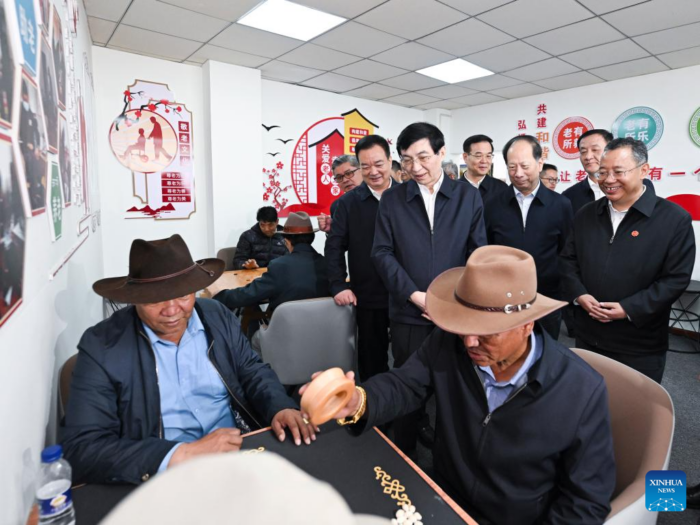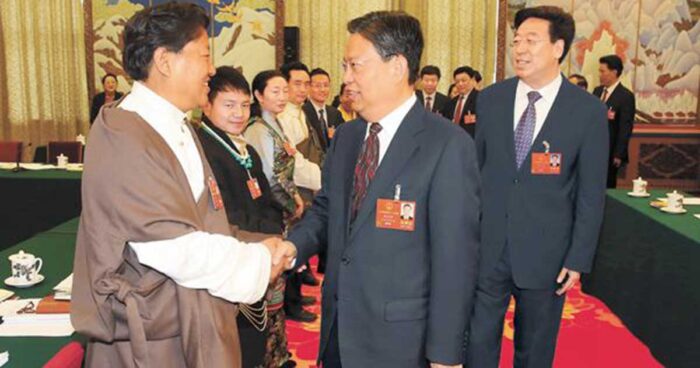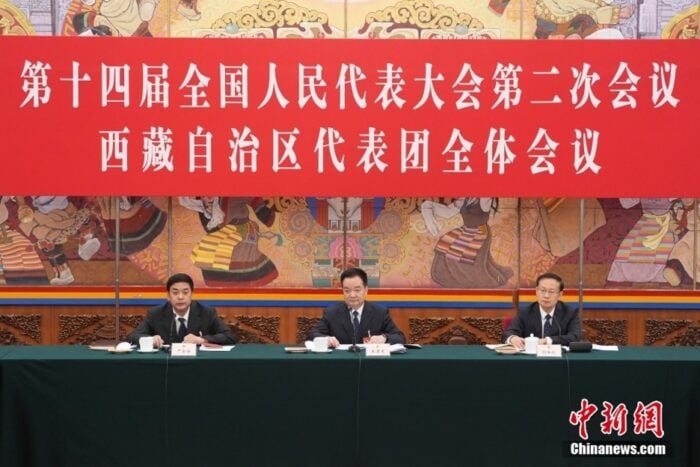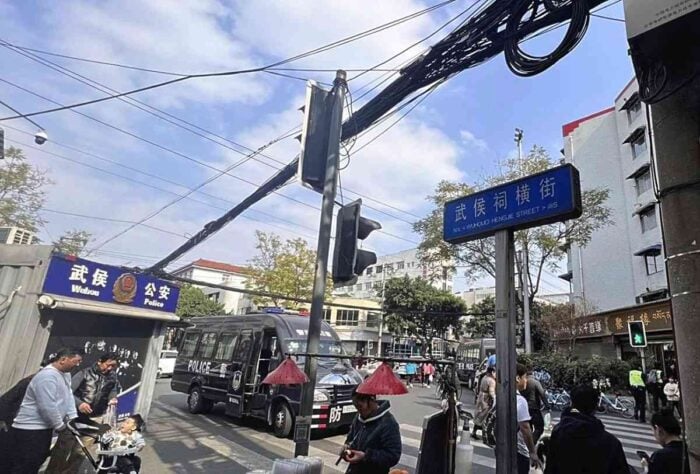The just-concluded annual Chinese political meetings known as the Two Sessions have shown that President Xi Jinping and his administration are turning China into an increasingly ideological security state and continuing their plans to “Sinicize” Tibetan Buddhism, as well as all other aspects of Tibetan life.
National leaders’ references to Tibet
This year’s annual meetings of China’s National People’s Congress (NPC) and the Chinese People’s Political Consultative Conference (CPPCC), held between March 4 and March 11, 2024, saw the Chinese leaders unitedly supporting the approach that puts ideology above all other aspects of people’s lives. On Tibet, there were some focus from the top leadership, both directly and indirectly, all furthering plans to change the Tibetan identity into that of a Chinese one.
The Chair of the CPPCC Wang Huning, in his report on March 4, 2024, made a direct reference to Tibet. In the fifth point of his report outlining the CPPCC work in the past year, Wang said, “Studied and implemented the Party’s strategy for governing Tibet in the new era and the Party’s strategy for governing Xinjiang in the new era, and carried out 10 research and inspections in Tibet, Xinjiang, and Tibet-related counties in Sichuan Province on promoting the sinicization of Tibetan Buddhism and promoting the sinicization of Islam in Xinjiang. Strengthened the exchanges, exchanges and integration of various ethnic groups, historical interpretation, publicity and education, and strengthen in-depth research on the awareness education of the Chinese nation community in colleges and universities.”[1]
The reference to Tibetan Buddhism is consistent with the Chinese Communist Party’s call for the Sinicization of all religions, including Tibetan Buddhism, at the 19th Party Congress in 2017 and the subsequent 2019 five-year plan to Sinicize Buddhism launched by the state-backed Chinese Buddhist Association. Sinicization refers to the process of forcing non-Chinese groups to assimilate into Chinese culture and become loyal to the CCP. Xi Jinping made structural changes in 2018 in the party-state system by putting the notorious United Front Work Department (UFWD) in charge of overseeing the implementation of religious policy. Placing a mass organ of the CCP above the state administration has been a regular occurrence recently in several policy fields, especially in discipline inspection.

CPPCC Chair Wang Huning (center) during his visit to Lhasa, Tibet, in July 2023.
In his report to the NPC on March 8, 2024, Chair Zhao Leji mentioned the “Law on Ecological Conservation of the Qinghai-Tibet Plateau” that was passed in 2023 that “provides legal guarantees for ecological conservation and sustainable development of the Qinghai-Tibet Plateau.”[2] Zhao added, “we pushed the parties concerned to overhaul relevant normative documents.” Zhao also mentioned that this year they will hold a symposium to commemorate the 40th anniversary of the Law on Regional Ethnic Autonomy, which became effective on Oct. 1, 1984 and is the foundational legislation that purportedly provides rights to Tibetans and others considered “ethnic minorities.”

Zhao Leji interacting with Tibetan delegates to the 13th NPC in Beijing in 2018
Chinese Premier Li Qiang did not make a direct reference to Tibet in his work report to NPC on March 5, 2024.[3] However, the report included plans that will have an impact on the Tibetan people. Li said, “We will support old revolutionary base areas and areas with large ethnic minority populations in accelerating development, strengthen development of border areas, and advance the program for boosting development and raising living standards in border areas.” In Tibet, this program for boosting development had a political agenda and included rural revitalization initiatives that primarily meant intensifying the slaughter rate of yaks and sheep. A fast-spreading viral infection had started in 2018 in China and resulted in the deaths of almost half its hogs, either from disease or compulsory culling to contain the viral spread. As China urgently needed to boost meat supply, and with obvious sources of pork imports, including the USA, off the agenda for political reasons, yak meat from Tibet became a target. The process was put within the strategy for promoting rural revitalization.
Li added, “We will, with a focus on forging a strong sense of community for the Chinese nation, uphold and improve the system of regional ethnic autonomy, promote interaction, exchange, and integration among all ethnic groups, and speed up the modernization drive in ethnic minority regions.”
Confirming the concerns about the CCP’s intention to Sinicize Tibetan Buddhism, Li also said, “We will adhere to the Party’s basic policy on religious affairs, ensure that religions in China must be Chinese in orientation, and provide guidance to religions so that they can adapt themselves to our socialist society.”
President Xi Jinping did not address the plenary sessions of both the NPC and the CPPCC, but he did address meetings of delegations, though none of them were Tibetan. During the “Two Sessions” in 2021, Xi participated in the deliberations of the Qinghai delegation and even recalled his visit to Yushu after the earthquake of 2010.[4]
Spotlight on economic disparity in Tibet
Although not intended by the Chinese authorities, this year’s Two Sessions put the spotlight on the critical fact that Chinese policies on Tibet have failed even on non-political fields like the economy. Tibet has not become economically self-reliant even after more than six decades of Chinese claims of development.
Specifically, a statement by the Tibet Autonomous Region Governor Yan Jinhai reveals that TAR, which China claims has found the “the right path for economic growth,”[5] only survives economically even in 2024 because of Beijing’s subsidy. During the open group meeting of the Tibetan delegation to the NPC on March 6, Yan appeared proud of “high-quality economic development” but revealed the reality when he said, “central government fiscal subsidies to Tibet have cumulatively reached over 1.7 trillion yuan ($236 billion), which makes up 90.3% of Tibet government finances.”[6]

TAR governor Yan Jinhai (l) and party secretary Wang Junzheng (c) at the meeting in Beijing on March 6, 2024
Yan added, “Last year alone, the central government’s fiscal transfers to Tibet exceeded 250 billion yuan ($34.7 billion), which per capita equals over 100,000 yuan ($13,890). This is the highest out of all China’s 31 provinces, regions and municipalities.”
Previous Chinese official statements have confirmed this lamentable economic condition of the TAR. In 2015, they said that from 1952 to 2013, subsidies to the TAR reached 544.6 billion yuan, accounting for 95% of its finances.[7]
It is estimated that financial aid from the central budget totaled 1.24 trillion yuan from 1980 to 2018, making up 91 percent of its finances.[8]
In 2015, Tibet watcher Andrew M. Fischer wrote, “Analysts and scholars — including Chinese economists and social scientists — have long been critical of Beijing’s development strategy in Tibet. A heavy dependence on state subsidies to maintain high levels of economic growth cause economic inefficiencies and social inequalities.”[9] The fact that this situation continues even in 2024, nine years later, indicates that fundamentally the Chinese authorities have failed to provide stable economic development in TAR.
Fischer also states that Qinghai, which contains most of the Tibetan area of Amdo, is the next most subsidized province under the People’s Republic of China.
Stability, development, ecology and strong borders as focus areas for 2024
While the Two Sessions were taking place, Wang Junzheng, the TAR party secretary, outlined the Chinese leadership’s plans for this year. Participating in People’s Daily Online’s “My Message to the Two Sessions” program, Wang said on March 6, “In 2024, we will adhere to Xi Jinping Thought on Socialism with Chinese Characteristics for a New Era to govern the overall work in Tibet, fully and accurately implement the Party’s strategy for governing Tibet in the new era, focus on the ‘four major issues’ of stability, development, ecology, and strong borders, and strive to promote Tibet continues to take new steps towards long-term peace and stability and high-quality development.”[10]
Similarly, participating in the TAR delegation meeting on March 6, Wang emphasized implementation of the party’s decisions to achieve the party’s goals of “long-term stability and high-quality development”; the former a perennial goal and the later a goal since the 20th Party Congress in October 2022. Wang’s discourse, with keywords such as “grassroots governance,” “rural revitalization” and “people’s livelihood,” indicates the party’s continued focus on Tibet’s rural areas and tweaking the governance model.[11]
Beijing leaders at this year’s Tibet-related meetings
On March 6, the TAR delegation to the NPC held a plenary meeting, which was attended by Zhang Guoqing, a member of the Political Bureau of the CPC Central Committee and a vice premier. Zhang is, interestingly, a delegate to the 14th NPC assigned to the TAR and had also participated in the TAR delegation meeting in the 2023 Two Sessions, too.
State media also reported that Huang Runqiu, minister of Ecology and Environment, and Sun Yeli, minister of the Ministry of Culture and Tourism, attended the TAR delegation meeting this year. However, there is no report that Pan Yue, vice minister of the Central United Front Work Department and director of the National Ethnic Affairs Commission, who attended last year’s TAR delegation meeting, did so this year.
Drinking death of a Tibetan party leader raised at Qinghai delegation meeting
Chinese state media reported that on March 6, at the open group meeting of the Qinghai delegation, Chen Gang, Qinghai party secretary, had to respond to queries concerning the revelation of a senior provincial Tibetan leader’s death due to excess drinking during a Chinese Communist Party-organized event in December 2022. As the International Campaign for Tibet reported in May 2023, in the evening of Dec. 11, 2022, Dorjee, the party secretary of Tsojang prefecture and a member of the Qinghai Provincial Party Committee, died following a drinking stint with fellow cadres. The issue raised much public concern.[12] Chen is reported to have said, “This incident, which seriously violated the spirit of the central government’s eight regulations, is a ‘sore spot’ and ‘injured spot’ for Qinghai cadres.”[13]
Cai Qi, member of the Standing Committee of the Political Bureau of the CPC Central Committee and secretary of the Secretariat of the CPC Central Committee, attended the Qinghai delegation meeting on March 7, state media reported.
Increased surveillance of Tibetans expected
On Feb. 27, 2024, days before this year’s Two Sessions, China’s National People’s Congress approved the revision to the Law on Guarding State Secrets, introducing a clause that gives officials the leeway to deem any information as a state secret.[14]
Article 64 of the amended law states, “Organs and units are to apply work secrets management measures and employ the necessary protective measures for matters generated or obtained by organs or units in the course of performing their functions that are not state secrets but would cause a definite adverse impact after leaking. Provisions on the management of work secrets are to be provided separately.”
“Leaking state secrets” has been one of the spurious charges used by China to detain and control Tibetans. The amended law would only make it easier for the authorities to exploit it in their “stability management” of Tibetans. It is possible that the authorities will use this law against those Tibetans in Derge who are highlighting the negative impact of the hydropower dam project in their area, some information of which has been circulating in the international media. This law will take effect on May 1, 2024.
China still not confident in Tibet
Despite all their claims in meetings during this year’s Two Sessions and all the coercive measures they’ve used to control the Tibetan people for the past several decades, the Chinese authorities still lack the confidence that the Tibetan people support their initiatives. Therefore, in the period before the Two Sessions, the timing of which also fell during the anniversary of the Tibetan National Uprising, there was a noticeable escalation of security measures in areas of Tibetan residence.
In the Tibetan capital Lhasa, a virtual meeting was held by the Lhasa City Stability Maintenance Command on Feb. 26[15] “to do a good job of maintaining stability and security during the two sessions.” County leaders, temple management committees and various stability maintenance units were instructed to attend the security meeting.
This meeting appears to focus on suppressing dissent and tightening control rather than addressing genuine security concerns. There was emphasis on political vigilance with focus on “enhancing political position” and aligning thoughts with party directives. The officials were asked to investigate issues like submission of petitions and to nip them in the bud.
Similarly, on Feb. 29, Chen Yongqi, deputy secretary of the TAR Party Committee and executive vice chairman of the TAR government, addressed a meeting in Chushul (Qushui) county in Lhasa City, where he emphasized that everyone “must conscientiously implement the work arrangements of the autonomous region Party committee and the work requirements of the district stability maintenance headquarters, always regard maintaining stability as the first task, implement detailed work measures, and tighten the responsibilities, highlight key areas, strengthen emergency drills, implement operating procedures, resolutely ensure social harmony and stability during the national Two Sessions, and strive to create a good social environment for economic and social development.”[16]

Yomiuri Shimbum photo of Feb. 17 of police vehicles deployed at an intersection in Chengdu, where Tibetans gather
Interestingly, an article in the CCP theoretical journal Seeking Truth (Qiushi) on March 16, 2024, attributed to the Tibet Autonomous Region Party Committee, says, “Casting a firm sense of Chinese national community is the main line of China’s ethnic work, and also a strategic task of Tibet’s work.”[17] The article continues, “The Party Committee of the Autonomous Region has firmly established the overall concept of national security, insisting on maintaining stability as its first task, keeping the alarm bells ringing and vigilance constant, and, by means of a scientific mechanism and the concepts of normalization and the rule of law, doing the work of maintaining stability on a daily basis and at the grass-roots level, so as to constantly make the cornerstone of security and development more stable and secure.”
Even though independent foreign journalists are not given permission to report from Tibet, a report by a Japanese newspaper from Sichuan’s capital Chengdu reveals how Tibetans there had to undergo tightened state control in the period before the Two Sessions. In the middle of February, the Japanese journalist visited the area in Chengdu where Tibetans reside and reported, “heavily armed police officers could be seen stationed at every corner of an intersection, keeping a watchful eye on Tibetan monks and residents.”[18]
Footnotes:
[1] Wang Huning, Work report of the Standing Committee of the National Committee of the Chinese People’s Political Consultative Conference, Xinhuanet, March 10, 2024, https://web.archive.org/web/20240318134522/http://www.cppcc.gov.cn/zxww/2024/03/10/ARTI1710083212795493.shtml
[2] Zhao Leji, Report on the work of the Standing Committee of the National People’s Congress, delivered at the Second Session of the 14th National People’s Congress, March 8, 2024, https://npcobserver.com/wp-content/uploads/2024/03/2024-NPCSC-Work-Report_EN.pdf
[3] Premier Li Qiang, report on the work of the Government, NPC Observer, March 5, 2024, https://npcobserver.com/wp-content/uploads/2024/03/2024-Government-Work-Report_EN.pdf
[4] “Two sessions” meeting: assimilation in Tibet to continue, International Campaign for Tibet, March 29, 2021, https://savetibet.org/two-sessions-meeting-assimilation-in-tibet-to-continue/
[5] Tibet Since 1951: Liberation, Development and Prosperity, White Paper, State Council Information Office, May 21, 2021
[6] ‘No serious mass political incidents’ in Tibet last year, says senior official, Laurie Chen, Reuters, March 6, 2024 https://www.reuters.com/world/asia-pacific/no-serious-mass-political-incidents-tibet-last-year-says-senior-official-2024-03-06/
[7] China Voice: Tibet’s development; a path of hope, Xinhua, April 15, 2015, https://web.archive.org/web/20240318151825/http://us.china-embassy.gov.cn/eng/zt/zgxz/201504/t20150420_4916655.htm
[8] Tibet’s democratic reform strengthens ethnic equality, unity: white paper, Xinhua, March 27, 2019, https://web.archive.org/web/20240318152311/http://www.xinhuanet.com/english/2019-03/27/c_137926989.htm
[9] Tibet’s economic growth an accounting illusion?, Andrew F. Fischer, East Asia Forum, July 9, 2015, https://eastasiaforum.org/2015/07/09/tibets-economic-growth-an-accounting-illusion/
[10] Wang Junzheng, deputy to the National People’s Congress and secretary of the Party Committee of the Tibet Autonomous Region, replied to People’s Daily Online netizens, March 06, 2024, https://web.archive.org/web/20240318164818/http://leaders.people.com.cn/n1/2024/0306/c58278-40189871.html
[11] Tibetan delegation holds plenary meeting, Tibet Daily, March 07, 2024, https://web.archive.org/web/20240318165506/http://xz.people.com.cn/n2/2024/0307/c138901-40767660.html
[12] Drinking death of provincial Tibetan leader raises concerns about behavior of CCP cadres, International Campaign for Tibet, May 5, 2023 https://savetibet.org/drinking-death-of-provincial-tibetan-leader-raises-concerns-about-behavior-of-ccp-cadres/
[13] Open group meetings were held intensively, and local officials responded to hot topics, China News Network, March 08, 2024, https://web.archive.org/web/20240318171301/https://backend.chinanews.com/sh/2024/03-08/10176745.shtml
[14] PRC Law on the Guarding of State Secrets, CHINA LAW TRANSLATE, Feb. 27, 2024, https://www.chinalawtranslate.com/en/secrets-law-2024/
[15] Citywide Stability Maintenance Video Dispatch Meeting Held,
Lhasa Post, Feb.26, 2024, https://archive.ph/xGtOl#selection-219.14-451.45
[16] Adhering to the Two-Handed Approach, Maintaining Social Stability with All-Out Efforts to Promote High-Quality Development, Tibet Daily, March 4, 2024, https://web.archive.org/web/20240319160438/https://www.xizang.gov.cn/xwzx_406/zwyw/202403/t20240304_405853.html
[17] Integrating, Accurately and Comprehensively Implementing the Party’s Governance Strategy for Tibet in the New Era Striving to Build a New Socialist Modernized Tibet, CPC Tibet Autonomous Region Committee, Seeking Truth, March 16, 2024. https://web.archive.org/web/20240319161553/http://www.qstheory.cn/dukan/qs/2024-03/16/c_1130089679.htm
[18] Tibetans Find Themselves Under Tighter Control by China 16 Years after Uprising, Miho Tamura, Yomiuri Shimbun, March 16, 2024, https://japannews.yomiuri.co.jp/world/asia-pacific/20240316-174800/

